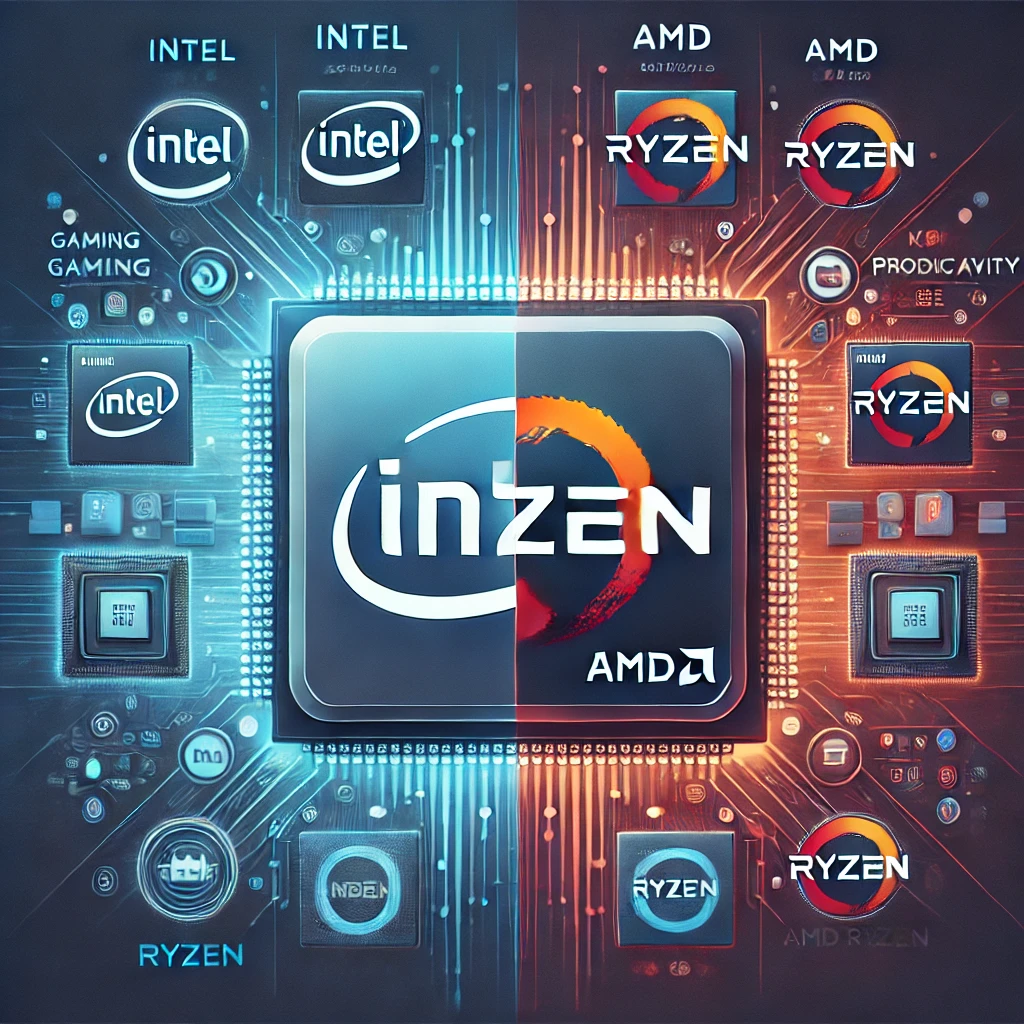Intel vs. Ryzen: Your Ultimate Guide to Choosing the Right Processor

Intel vs. Ryzen: Your Ultimate Guide to Choosing the Right Processor
It’s the age-old question for anyone building or upgrading a computer—Intel or Ryzen? The processor is like the engine of a PC, and picking the right one can make all the difference in performance. Intel has been a big player for decades, while AMD, with its Ryzen series, has been shaking up the market. Today, let’s get into the nitty-gritty of which one might be the best fit for you.
Why This Battle Matters
When it comes to getting a new processor, it’s all about getting the right balance of power, efficiency, and price. Intel’s processors are known for being fast and reliable, but AMD has thrown down the gauntlet in recent years, giving Intel a real run for its money. Depending on what you want to do with your PC—whether it’s gaming, content creation, or just daily browsing—one of these might suit your needs a bit better.
What Makes Intel Stand Out?
- Single-Core Performance: Intel processors often have an edge with single-core performance, which means they’re perfect for tasks or games that rely more on one strong core than on several cores. If you’re running programs that don’t benefit much from a lot of cores—think Photoshop or everyday browsing—Intel may pull ahead.
- Gaming Edge: While Ryzen has been catching up, Intel’s higher clock speeds still give it a slight lead in pure gaming. If you’re a competitive gamer or someone who loves maxing out frame rates, Intel’s i5 or i7 series might be ideal for you.
Why AMD Ryzen is the Dark Horse?
- Multi-Core Powerhouse: Ryzen processors are known for their multi-core performance. AMD packs more cores and threads into its processors at similar price points, which makes Ryzen great for multitasking or power-hungry tasks like video editing and 3D rendering.
- Value for Money: AMD tends to win when it comes to price-per-core, making Ryzen processors a favorite for those wanting serious performance without breaking the bank. If you’re looking to stretch your budget, Ryzen can often give you more for your money.
Comparing Prices
One big draw for Ryzen processors is the value. For example, if you compare the Ryzen 5 5600X with Intel’s i5-11600K, you’ll often find the Ryzen processor a bit cheaper while still offering excellent multi-core performance. This makes it a popular choice for budget-conscious builders.
That said, Intel has been adjusting its pricing to compete with AMD, so it’s always worth checking the latest prices. Deals and discounts pop up all the time, especially around shopping holidays.
Power and Efficiency
This is where Ryzen has a bit of a lead. Ryzen processors, thanks to their 7nm process, tend to use less power and produce less heat than Intel’s 10nm or 14nm processors. For laptops, this difference can mean better battery life. And for desktops, it means you don’t need an overly complicated cooling setup.
Real-Life Case Study: Ryzen Laptops for Battery Life
Take the Ryzen 7 4800U. It’s a processor you’ll find in many thin-and-light laptops. Reviewers have noted that laptops with this processor often last longer on a charge than similar Intel-powered devices. If you’re on the go or value quiet, cool operation, this is something to keep in mind.
For Gamers: Which is Better?
Gamers are often split between Intel and Ryzen. Here’s why:
Intel: With slightly higher clock speeds, Intel processors can give you a few more frames per second (FPS), especially in games that rely more on single-core performance. If you’re playing a game that needs quick single-core speed (like many first-person shooters), Intel could give you a slight advantage.
AMD Ryzen: For gamers who also like to multitask—say, running a game while streaming or using multiple monitors—Ryzen’s extra cores and threads can make a noticeable difference. You get better performance for streaming or running background apps while gaming, making Ryzen 5 or Ryzen 7 models ideal here.
For Creators: Intel or Ryzen?
If you’re into content creation, like video editing or 3D rendering, Ryzen is often the go-to choice. The extra cores and threads make Ryzen processors perform better for these types of tasks. Programs like Adobe Premiere or Blender can use multiple cores to render faster, so having a 12-core Ryzen 9 can feel like a night-and-day difference compared to an 8-core Intel model.
However, Intel still performs well in single-threaded tasks, so if your workflow is lighter or doesn’t require lots of multi-core power, Intel’s i7 or i9 processors are still solid options.
General Use and Budget Builds
If you’re just using a computer for basic tasks—web browsing, streaming, working on documents—both Intel and Ryzen have affordable options. However, if you’re building a budget PC, Ryzen 3 processors often provide more value than Intel’s Core i3 options, especially if you occasionally do light gaming or multitask.
– Intel Core i3: Reliable, power-efficient, and good for everyday tasks.
– AMD Ryzen 3: Slightly better performance for a similar price, with extra threads for occasional gaming or multitasking.
Decision Time: Which Processor Fits Your Needs?
In the end, here’s how to think about your choice:
– Choose Intel: if you want higher single-core performance for specific applications, slightly better gaming FPS, or if you’re running single-threaded software.
– Choose Ryzen: if you need strong multi-core performance, are building a system on a budget, or want a cooler, more power-efficient processor.
Final Thoughts
Both Intel and Ryzen offer amazing performance across their ranges, so you’re not going to go wrong either way. But knowing your specific needs—whether it’s gaming, content creation, or general productivity—helps make the decision clearer. For the best deals, keep an eye on tech sales and compare prices. With this guide, you’re all set to make an informed choice and get the processor that’s just right for you!